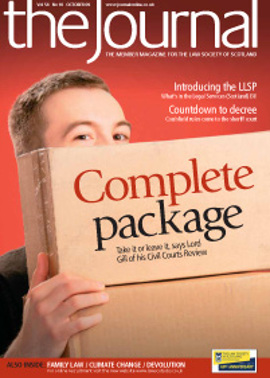Law out of step

Park, Petitioner [2009] CSOH 122
(25 August 2009) concerned a competition between missives and an inhibition as to which came into being first, and whether the missives were affected by the inhibition.
The inhibition came into effect at midnight on 31 August 2007, being the date of registration of a notice of inhibition against the seller. On 2 August 2007 Carr Berman Crichton (CBC), who acted for the purchaser, had sent an offer to purchase to Sneddon Morrison (SM) for the sellers. A qualified acceptance was produced in draft by SM and then negotiated between the parties before it was engrossed and signed. On 31 August, at about 1450, the signed qualified acceptance was faxed by SM to CBC. On receipt of this fax, CBC immediately faxed an unconditional acceptance back to SM. Both parties placed their respective signed principal copies in the post that evening prior to 1700.
Defining “delivery”
Under Scots law, there is a general rule that missives require to be “delivered” to be effective and binding. The question in this case was whether a fax transmission was sufficient to constitute delivery of missive letters, or whether delivery of the principal missive letters themselves was required. The sellers contended that it was competent to deliver missive letters by fax and thus the inhibition did not attach to the sellers’ property. The party seeking to enforce the inhibition (the sellers’ creditor) contended that it was not competent to deliver missives by fax and that delivery of the principal signed qualified acceptance was necessary.
The sellers cited various authorities in support of their contention that the missives had been delivered by fax. One of the cases they referred to was McIntosh v Alam 1998 SLT (Sh Ct) 19. In this case, the sheriff opined that it would be incorrect to state that a signed acceptance might only be communicated by delivery of the original document: in his view, such an acceptance might equally well be communicated by fax. In Merrick Homes Ltd v Duff 1996 GWD 9-508 (OH); 1996 SC 497 (IH) Lord Gill opined that an offer and acceptance “can be communicated as validly by fax as it would be by delivery by hand or by post”, but his comments were obiter. The Inner House reserved judgment on whether a contract that required to be in writing could be delivered/concluded by fax.
The sellers’ creditor argued under reference to Stamfield’s Creditors v Scott (1696) Br Supp IV 344 that the law in Scotland is hostile to the delivery of anything other than a principal document. Reference was also made to Erskine’s Institute, III ii 43, which provides that “A writing while it is in the granter’s custody is not obligatory; for as long as it is in his own power he cannot be said to have come to a final resolution of obliging himself by it.”
Temporary Judge M G Thomson QC in the present case was of the view that delivery of missives was a definite requirement of Scots law, the principal reason for the delivery rule being that “as long as a writing remained in the granter’s own custody, he was free to change his mind and to destroy it or at least not to deliver it”. In terms of whether the granter was barred from destroying the principal by virtue of the fact that it had been faxed, the judge was of the opinion that this would depend “upon the intention of the parties which may be derived either from a general practice among solicitors or from a specific agreement between the particular solicitors exchanging the particular missives. In the present case there was no suggestion of such a particular agreement either from the terms of the original offer or any ancillary agreement between the solicitors. Neither was there any suggestion of a general practice among members of the profession”.
The judge also opined that if the solicitor sending the fax provided that they would thereafter hold the principal on behalf of the receiving solicitor, that would be sufficient to achieve constructive delivery.
No alternative
Notwithstanding that the judge in the present case was not aware of any general practice among members of the profession, in practice missives in the majority of transactions are concluded by fax or, perhaps more commonly in commercial transactions, by email. This is unavoidable given the tight timescales within which transactions must be concluded and the expectations of our clients in this digital age. There was generally an understanding amongst solicitors that a faxed (or scanned pdf) copy of the signed document was irrevocable and it would have been unethical for either solicitor to alter, amend or fail to deliver a signed document that had been electronically transmitted to the other side. This was backed up by the Law Society of Scotland’s guidance on electronic communications issued in March 2007. The convention and consensus amongst the practising profession was that delivery by fax or, indeed by email, was sufficient to conclude missives.
Whilst there is no authority to the effect that a contract may be delivered by email, article 9 of the E-Commerce Directive 2000/31/EC, which was to be transposed into domestic law by member states by 17 January 2002, provides that member states must ensure that their legal systems allow contracts to be concluded by electronic means. This directive has not yet been implemented.
Covering terms
So where does this leave us? Following the guidance of the judge in this case regarding constructive delivery, it would be prudent for the solicitor sending the fax to provide in their covering letter that: (i) they are holding the principal document on behalf of the receiving solicitor’s clients; (ii) it is treated by their clients as having been delivered to the receiving solicitor on behalf of their clients; and (iii) it will be sent to the receiving solicitor in the post that night. This should achieve constructive delivery of the missives in accordance with the terms of the present case.
As regards the delivery of missives by email, this is an essential part of modern day conveyancing and is expected by the majority of clients. In practice, the majority of solicitors are still concluding missives by email, with their covering emails containing the undertakings set out at (i) to (iii) above. The exact undertakings provided by the various firms appear to vary slightly in form but the substance is largely the same. It would, however, be useful to have a standard form of wording that is accepted across the profession. The Law Society of Scotland has advised that its Conveyancing Committee is looking into the decision in this case and we look forward to receiving its guidance in due course.
As to whether this case will be appealed, the sellers had also raised an argument that if it was found that the subjects had been caught by the inhibition, they should be released on the grounds of oppression. It is understood that a proof before answer will now be held to consider this point. It could, therefore, be some time before we find out whether this case will be appealed. It can only be hoped that further judgments of the court will acknowledge that we now live in a digital age and take into account the accepted conventions and practices of a profession that is founded on strict ethical principles.
In this issue
- The Combined Standard Clauses (2009 edition)
- Preserving a legal inheritance: settlement rights in the "Occupied Palestinian Territories"
- The European Court and the duty to investigate deaths
- Chief Executive's SGM address
- Shelter's online resources
- Musical copyright and contract
- The international swap shop
- Headline fortnight
- The Gill Report? What's not to like?
- Solicitor advocates and conflicts of interest
- Settlement in the West Bank
- Package deal
- RoS = economic value
- Defining the future
- Global leader?
- Dog's chance
- Coulsfield rules OK
- Money and your life
- Experts on the case
- At the hub, 10 years on
- Guardians: don't look to the Fund
- From the Brussels office
- Ask Ash
- Making the most of ABS
- Planning for growth
- The perils of posting
- ARTL: friend or foe?
- Where privacy prevails
- How was it for you?
- Agreeing rescues with creditors
- Adopting new solutions
- Divorce for gender change
- Scottish Solicitors' Discipline Tribunal
- Book reviews
- Website review
- A safe pair of hands tops the bill
- Law out of step






